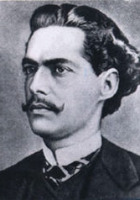Antonio de Castro Alves
Antonio de Castro Alves Poems
Antonio de Castro Alves Biography
Antônio Frederico de Castro Alves was a Brazilian poet and playwright, famous for his abolitionist and republican poems. One of the most famous poets of the "Condorism", he won the epithet of "O Poeta dos Escravos" ("Slaves' Poet"). He is the patron of the 7th chair of the Brazilian Academy of Letters. Alves was born in the town of Curralinho (rechristened "Castro Alves" in his honor in 1900), in the Brazilian State of Bahia, to Antônio José Alves, a medician, and Clélia Brasília da Silva Castro, one of the daughters of José Antônio da Silva Castro (a.k.a. "Periquitão", Portuguese for "Big Parakeet"), a proeminent fighter in the 1821–23 Siege of Salvador. In 1853, he was sent to study in the Colégio Sebrão, run by Abílio César Borges, the Baron of Macaúbas. There, he would meet and befriend Ruy Barbosa. In 1862, he moved to Recife in order to study at the Faculdade de Direito do Recife, but he was disapproved twice. He only was able to enter the college in 1864, where he met Tobias Barreto and José Bonifácio the Young, step-grandson of famous statesman José Bonifácio de Andrada e Silva. They would heavily influence Alves' writing style, and in turn, Alves also influenced them both. His father would die in 1866, and short after, he would start dating the Portuguese actress Eugênia Câmara. In 1867, Alves returns to Bahia alongside Câmara, and there he writes his drama Gonzaga, ou A Revolução de Minas, based on the life of famous Luso-Brazilian Neoclassic poet Tomás António Gonzaga and his participation in the failed 1789 Minas Conspiracy. In the following year, he and Câmara would go to São Paulo, where Alves entered the Faculdade de Direito da Universidade de São Paulo and once more would meet Ruy Barbosa. In there, he also befriended Pedro Luís Pereira de Sousa, and wrote a poem named "Deusa incruenta", based on Sousa's work "Terribilis Dea". Pedro Luís Pereira de Sousa, José Bonifácio the Young, Victor Hugo, Tobias Barreto, Lord Byron, José de Espronceda influenced from Alves. He influenced by José Bonifácio the Young, Raimundo Correia. His play Gonzaga would be performed on the end of 1868, being well-received by critics and public alike, but Alves was sad because his romantic engagement with Eugênia Câmara had terminated. During a hunting in the same year, Alves received an accidental springald shot in his left foot, that had to be amputated due to the menace of a gangrene. He would spend the year of 1870 in Bahia, trying to recover from the tuberculosis he got while in São Paulo. Also in 1870, Alves published the poetry book Espumas Flutuantes — the only work he would publish during his lifetime. All his other works would receive a posthumous publication. Alves' attempts to mitigate the tuberculosis were in vain; he would die on 6 July 1871, in the city of Salvador, at 24 years old. Representations in popular culture Alves was portrayed by Paulo Maurício in the 1949 film Vendaval Maravilhoso, loosely based on Jorge Amado's 1941 book ABC de Castro Alves, and by Bruno Garcia in Sílvio Tendler's 1999 documentary Castro Alves: Retrato-Falado do Poeta.)
The Best Poem Of Antonio de Castro Alves
Goodbye
GOODBYE - O ungrateful child!
You said to me - goodbye -?
Madness! better it would be
To separate the land from the skies.
- Goodbye - somber word!
Of a frozen and cold soul
You are the last flower.
- Goodbye! - misery! lie
Of a breast that does not sigh,
Of a heart without love.
O Lord! The wasteland bird
dies without a mate.
The lightning that burns the cedar
Burnt the parasite.
The star flirts with the dew:
- One is the star of the twig,
- The other is the dew of the amplitude.
But, at the light of the rising sun,
The star - in the west dies!
The dew - dies in the soil!
Never the fogs of the valley
Learnt how to say - goodbye -
If together they ascend from the ground,
Together they are lost in skies.
The wave dies on the shore…
But another wave comes soon
To die of the same pain…
- Goodbye - somber word!
Do not say - goodbye -, Maria!
Or do not speak to me of love!

I CRYED WHEN A WRITED THE POEM, A ORFÃ NA SEPULTURA MARVERLOUS,